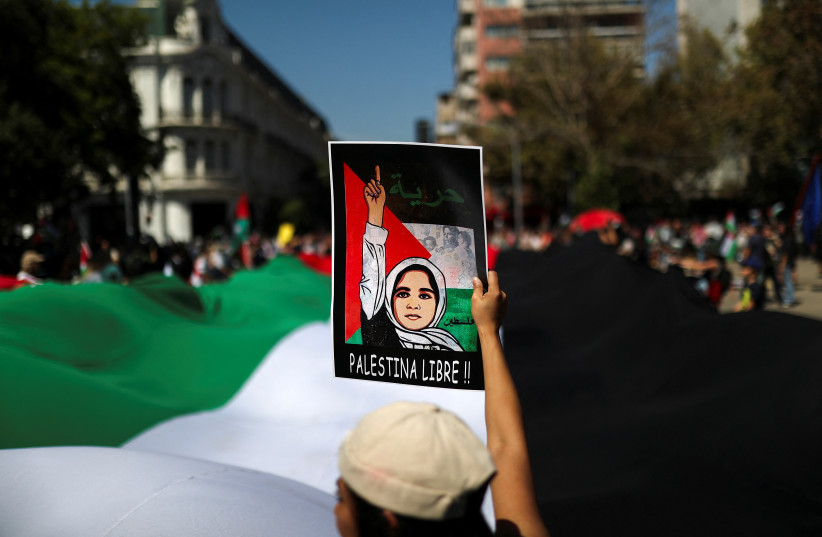En route to her cousin’s wedding, a pregnant woman, her husband, and their seven-year-old son found themselves trapped in their car, encircled by a mob of angry, hostile rioters.
The mob shook their vehicle while screaming “genocidal murderer” at the young boy. Their aggression intensified upon noticing the pregnant woman’s stomach, as they shouted, “Pregnant! You’re carrying a genocidal murderer inside!”
On March 28, 2024, an antisemitic attack occurred at the Estadio Israelita, the local Jewish Community Center in Santiago, Chile. Waving Palestinian flags and signs bearing hateful insults and slogans, this incident is one of many faced by Chile’s Jewish community, particularly since the October 7th assault by Hamas on Israel.
The mother’s poignant reflection on the experience highlights the profound emotional toll of antisemitic hostility and the pressing imperative to address it. She expressed, “It’s a primitive feeling deeply ingrained and passed down. It doesn’t allow any kind of introspection or dialogue. It’s not driven by politics, religion, or advocacy for human rights. It’s hatred, period.”
As the Anti-Defamation League’s senior vice president of International Affairs, and as former Israeli ambassador to Chile, I’m deeply troubled by the alarming escalation of anti-Jewish sentiment in Chile.

You should be too.
These reprehensible acts are not isolated occurrences but part of a disturbing trend that threatens the fundamental values of tolerance, diversity, and mutual respect upon which our society is built. The firsthand accounts shared by members of the Jewish community paint a distressing picture of intimidation, fear, and hatred directed towards them solely because of their identity.
This narrative serves as a stark reminder of the insidious nature of antisemitism and its capacity to permeate even the most innocuous of settings.
The testimonies of those who have experienced antisemitic hostility firsthand underscore the urgent need for our joint efforts to address this surge of hate. It is imperative that we, as a society, stand in solidarity with the Jewish community and unequivocally condemn antisemitism in all its forms.
Just as we would do for any other marginalized community, now is our time to step up for the Jewish community.
As we confront the scourge of antisemitism in Chile, it is imperative to acknowledge the role that leadership plays in shaping public discourse and attitudes. Unfortunately, recent anti-Israel actions by political leaders have raised concerns that they are contributing to a climate of hostility towards their own Jewish community. President Gabriel Boric’s delayed condemnation of Hamas’s reprehensible attack on Israel on October 7, coupled with the filing of a lawsuit against Israel in the International Criminal Court, and the absence of any direct engagement with the Jewish community since assuming office, are but a few troubling instances.
Such actions not only undermine diplomatic relations with Israel, but also risk exacerbating tensions and fueling antisemitic sentiments within the country. While criticism of Israeli policies is certainly legitimate, Boric and the Chilean government’s aggressive anti-Israel stance is seen as an act of hostility towards the Chilean Jewish community.
It is essential for leaders, whether in Chile or the United States, to recognize the responsibility they bear in fostering an inclusive and respectful society, one that rejects hatred and discrimination in all its forms.
Just as leaders have their obligations, so do we
Amidst adversity, let us draw inspiration from the everyday acts of resilience within the Jewish community. Consider the mother, her husband, and their young son, enveloped by hostility yet unwavering in their dignity and compassion. Despite the fear and uncertainty of the situation, the mother seized a moment to impart a valuable lesson to her son.
She recounts her response to the harrowing situation: “Do you see these people?” she asked her son, gesturing towards the angry faces in the crowd. “They’re consumed by anger, but notice how many cover their faces. Deep down, they know their actions are wrong.”
In that pivotal moment, she conveyed a straightforward yet potent message: “Unlike them, we do not harbor hatred in our hearts. Despite the obstacles we encounter, we stand for light, not darkness.”
Through her actions and words, we are reminded of the resilience and humanity inherent within the Jewish community – a resilience rooted in dignity, compassion, and steadfast determination.
Let us draw strength from such examples as we confront antisemitism.
Only through collective action and unwavering commitment to justice and equality, can we hope to eradicate the scourge of antisemitism and build a society where all individuals are treated with dignity, respect, and compassion.
The writer is senior vice president, international affairs at the Anti-Defamation League (ADL).
